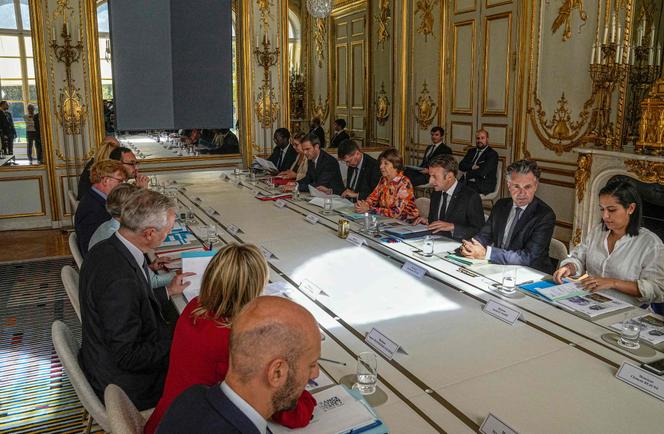


French President Emmanuel Macron finally got around to something that had been expected for months on Monday, September 25: Setting out an environmental roadmap and turning data on Excel spreadsheets into a plan for the future.
For a year, the General Secretariat for Ecological Planning (SGPE) has been drawing up graphs of expected greenhouse gas emission reductions, sector by sector. It is a way of paving the way to carbon neutrality in 2050 with a first target: A decrease in CO2 emissions by 55% in 2030 compared to 1990. At the end of a meeting with an environmental planning council, flanked by his prime minister and members of the government, Macron took the floor to lay out his vision of "French-style ecology" designed to respond to the triple challenge of "climate disruption and its consequences, a biodiversity collapse and the scarcity of resources."
This new political interest in climate issues has been called for by climate activists, scientists, and the left-wing part of the governmental majority. For around half an hour, Macron detailed his thinking about the environmental transition, laying out a doctrine rejecting any constraints or societal change. "We have decided to encourage our compatriots, not by imposing bans, but by persuading them to change more quickly," he said when talking about gas boilers, in a kind of sum-up of his approach. In May, Prime Minister Elisabeth Borne mentioned a ban on this type of heating in 2026.
Subjects such as a 110 km/h speed limit on highways – an idea proposed by the Citizens' Climate Convention in 2019 and still asked for by numerous organizations − meat consumption or aviation were not even touched on. Macron merely spoke vaguely of "a policy to transform behavior."
According to many advisors, the president knows that people's lifestyles will eventually have to change. A few days ago, he asked for a printout of the latest Intergovernmental Panel on Climate Change (IPCC) report and one by the High Council for Climate (HCC), which has been highly critical of his policies. However, he does not want these changes to occur as part of a break with previous approaches. Macron has not forgotten the Yellow Vest movement in 2018-2019. He is also believed to have been shocked by the German far-right's poll rise by leading the charge against a ban on gas and oil-fired boilers.
So, on Monday, he focused instead on the financial aid and support he wants to put in place for housing and transport, two crucial subjects for the daily lives of the French. "Thermal renovation of buildings must go hand in hand with a policy of fairness and accessibility. We will therefore have to help out the poorest households," he said, without specifying what kind of aid there would be but emphasizing that work on social housing would begin "rapidly." When a finance bill is presented on Wednesday, the MaPrimeRénov' scheme (financial aid to help households carry out energy renovation) will be increased from €2.4 billion to €4 billion. The amounts of bonuses and no-claims bonuses could also be changed, although the details are unknown.
You have 59.51% of this article left to read. The rest is for subscribers only.
